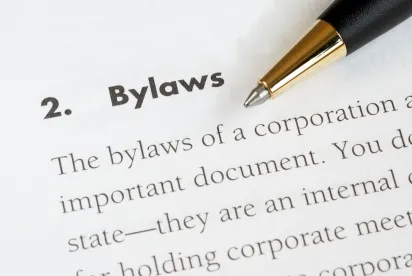If you are a business owner, when is the last time, if ever, that you read your corporate bylaws or your LLC’s operating agreement? Do you understand how they affect your control of the business?
Understanding how your corporate documents affect your ability to your control your business is vitally important, and even more so when you are applying for Disadvantaged Business Enterprise (DBE), Minority Business Enterprise (MBE) or Women’s Business Enterprise (WBE) certification. All three of these certifications require that the woman or minority owner legally controls the company.
You may be surprised how many owners think that they own a controlling share of their company, when, in fact, their corporate documents hamper their control. Some do not realize this until they are going through the certification process. Perhaps the company drafted its corporate documents itself or used an attorney that wasn’t familiar with the certification requirements. In any event, a review by a knowledgeable attorney prior to submission of the certification application could have helped reach a different outcome.
Where we most often see issues hampering the control of an owner are in quorum and voting requirements. This is highlighted by several recent decisions by the U.S. Department of Transportation, denying DBE certification based on issues with the companies’ corporate documents.
One such decision highlighted the importance of understanding the vote required for a company to take a particular action. The applicant company had a two-member board of directors. The company’s bylaws required a majority vote of the directors. With only two members, a majority vote would mean that both members had to agree, thus preventing the disadvantaged owner from controlling the board of directors. The USDOT denied the company’s request for certification. In re California Staffing Technology & Construction, No. 20-0101, November 2, 2020. The USDOT reached a similar decision in In re Multitech Group, Inc., No. 20-0042, August 31, 2020, where the company’s bylaws required a quorum of a “majority of the number of directorship” and there were only two board members.
Often, corporate documents contain provisions that require more than a mere majority vote to take certain actions. Supermajority votes are frequently associated with actions such as selling the company or closing the business. Another recent USDOT highlighted the problem with both supermajority and higher quorum provisions. The disadvantaged owner owned 55% of the company. The operating agreement required a quorum for a member meeting to consist of members holding 85% of the interests in the company. Additionally, several provisions required a 2/3 vote of the membership interest to act on behalf of the company. These provisions led the USDOT to decide that the disadvantaged owner did not legally control the company, and therefore it denied DBE certification. In re DeVere Weatherization and Construction Services, LLC, No. 20-0095, October 26, 2020.
Had any of these companies consulted with an attorney familiar with the DBE application requirements, they could have corrected the issues with their corporate documents prior to submitting their application.



 />i
/>i

